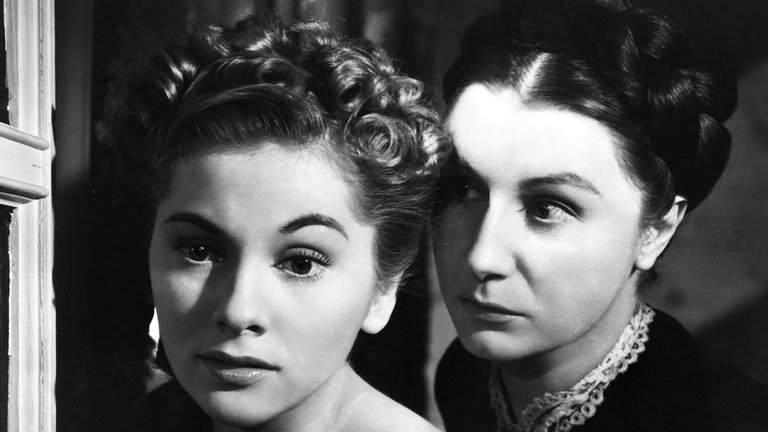Film Review: Rebecca (1940)

Oscar is the best known, but also the most overrated of all awards in the world of cinema. Arguments for such claim can be found in filmography of Alfred Hitchcock. Despite being one of the greatest directors that ever lived, Hitchcock never received Oscar for Best Director and 1940 psychological thriller Rebecca, the only of his films to received Oscar for Best Picture, is not among the first that come to mind when someone mentions Master of Suspense.
The film is based on 1938 bestselling novel by British author Daphne Du Maurier. It begins with narration of an unnamed protagonist (played by Joan Fontaine), who is introduced as young woman from modest family that, following the death of her father, makes ends meet by serving as paid companion to arrogant and tyrannical socialite Edythe Van Hooper (played by Florence Bates). While accompanying her employer in Monte Carlo she meets brooding but handsome British aristocrat Maxim De Winter (played by Laurence Olivier). The result is whirlwind romance and quick marriage, after which Maxim takes his bride to vast manor house of Manderley on the coast of Cornwall. She is at first happy to having place of such wealth and glamour as her new home, but the staff likes to compare her to Rebecca, De Winter’s first wife who tragically died one year earlier. Mrs. Danvers (played by Judith Anderson), chief maid, is especially relentless in reminding De Winter’s new bride of her deceased predecessor who was, by all accounts, more beautiful and popular than her. This begins to affect psychological state of new Mrs. De Winter until circumstances conspire to reveal the terrible secret behind Rebecca’s death and role Maxim might have had in it.
Decision to award Rebecca wasn’t completely unjustified. It is a very well made film. The only problem is that isn’t the thriller in pure “Hitchcockian” sense. It was Hitchock’s Hollywood debut, put into production by David O. Selznick, one of the few independent producers of the era. As such, Hitchcock approached it more like a hired hand and less like the Grand Author of Cinema he would like to present himself in the latter stages of his career. Instead, Rebecca looks more like standard Gothic romance Hollywood used to make at the time. The source material leaves little room for Hitchcock to employ his formula, including the suspense. The closest Hitchcock comes to it is the scene in the opening segment, when he plays with viewer’s expectations over whether the romance between protagonist and Maxim will end. Yet, despite not being Hitchockian in its usual sense, it still displays great directing talent. Hitchock confidently handles the plot, maintains relatively quick tempo and transitions between various segments with ease. Oppressive atmosphere of Manderlay (setting depicted partly in studios and partly through miniatures) is enhanced through music soundtrack by Franz Waxman and Oscar-awarded black-and-white cinematography by George Barnes. Hitchcock shows his inventiveness by never actually showing Mrs. Danvers entering the room with protagonist; instead she simply appears out of nowhere, making her presence more intimidating and almost otherworldly. Hitchcock also refuses to show any picture of title character, thus allowing viewers to create mental images of her in their heads.
Another large contribution to the success of Rebecca was made by cast. For Joan Fontaine, at the time known mostly as younger sister of established star Olivia De Havilland (who would later become her famous rival), role of the Mrs. De Winter was opportunity to show that she could carry film too. That opportunity was well-used. Fontaine plays protagonist as woman who is beautiful, young and naive and suffers abuse, first by her employer and than by near-demonical employee. Mrs. De Winter is, however, likeable acharcater and sympathy by the audience is awarded when she evolves in strong woman who ultimately finds cause worth fighting for. Laurence Olivier, at the time one of the most popular British actors, shines in the role of complicated protagonist, whose actions proves questionable and whose outbursts of bad temper lead to nearly catastrophic consquences. Olivier creates good chemistry with Fontaine although two actors didn’t got along well at the set (apparently, because Olivier was resentful over Selznick not casting his famous romantic partner Vivien Leigh in Fontaine’s role). Supporting cast is also great, especially Australian actress Judith Anderson, as near-demonic and insane housekeeper whose devotion to late Rebecca was in later years often interpreted as motivated by lesbian love. George Sanders also leaves good impression in the role of Rebbecca’s cousin and lover Jack Favell, despite appearing relatively late in the film. Segment featuring Favell, in which all plot elements are neatly explained and put together. It looks a little bit too convenient for Hitchcock’s film, but this is less to do with Hitchcock and more to do with Du Maurier’s original novel. The actual apocalyptic finale, on the other hand, is work of Hitchcock and it looks little bit over the top and not exactly cathartic.
Despite those flaws and not being exactly Hitchcockian, Rebecca is one of Hitchcock’s finer works and represents brilliant start of his Hollywood career. The novel itself was adapted number of times, mostly on television, and in 2020 new film version, starring Lily James, was produced by Netflix.
RATING: 8/10 (+++)
Blog in Croatian https://draxblog.com
Blog in English https://draxreview.wordpress.com/
Leofinance blog https://leofinance.io/@drax.leo
Unstoppable Domains: https://unstoppabledomains.com/?ref=3fc23fc42c1b417
Hiveonboard: https://hiveonboard.com?ref=drax y
Bitcoin Lightning HIVE donations: https://v4v.app/v1/lnurlp/qrcode/drax
Rising Star game: https://www.risingstargame.com?referrer=drax
1Inch: https://1inch.exchange/#/r/0x83823d8CCB74F828148258BB4457642124b1328e
BTC donations: 1EWxiMiP6iiG9rger3NuUSd6HByaxQWafG
ETH donations: 0xB305F144323b99e6f8b1d66f5D7DE78B498C32A7
Posted using CineTV
